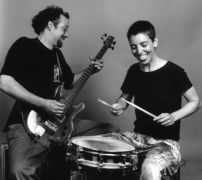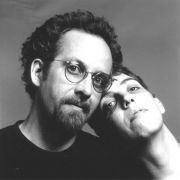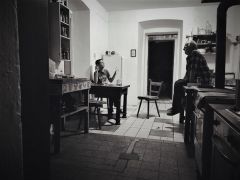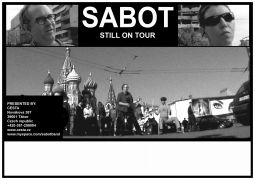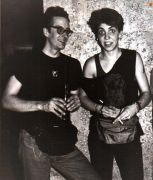Playing music, publishing an alternative culture magazine, studying art history and doing performance art in San Francisco California during the 80's led me to tour and travel in Europe during the early 1990's with our band Sabot. Meeting people and seeing the way things worked in Europe led us to moving to the Czech Republic in 1993 in order to develop and administrate a cultural center named CESTA in Tábor, South Bohemia.
Having operated alternative arts spaces and managed concerts in San Francisco for 15 years as well as touring and traveling in Europe for 3 years we had already been involved with many arts exchanges. Czech Republic being the home to many "underground" artists and musicians it seemed like a logical place to move our operation to. After a couple of years of startup work in Tabor we heard about Plasy so it was a natural place to visit and see how the Czech people managed an art center.
Plasy was a typical small town north of Plzen where there was a beautiful monastery which was being partly and temporarily used as an art center. Typically the citizens of the town were indifferent about the people who were working there, so it was peaceful and isolated. Milos, the initiator, had spent some time outside of Czechoslovakia so he had many international contacts; therefore the social dynamic was diverse. The facilities were rustic, so we did spend a lot of time in local bars and restaurants along with the artists.
The atmosphere of this deserted monastery was a virtual bee-hive of esoteric arts installations, performances, music and plenty of over talented people to meet and share ideas with. The helpers or administrators were promoters, students and other intellectuals who managed to get everything done. In that type of environment everyone was the same "class" so we were all there together - famous artists, students and superstars. As Czechoslovakia had been quite isolated during the cold war many of the important characters who were there seemed like "normal" people... a very good environment to test if your work would hold up to the test.
Not unlike many arts facilities in the world Plasy was a "temporary" re-purposed piece of architecture, eventually the project made some interventions to various locations in Prague and re-established it's residency facility in Schwarzenberger castle in Čimelice (South Bohemia). I visited Plasy several times since 1994; friends of ours and our co-administrators did some residency projects there as well. What we were building in Tábor was a permanent live-work facility so what we presented was a mix of arts and popular cultural activities; however the Plasy administrators saw us as of the same cloth so they invited us to perform there.
In 1999 we arrived in Plasy almost directly after returning from a 3 month music tour to China via Europe and Pakistan. After a hectic return and all the struggles of getting home, plus memories of all our experiences we finally arrived there. We were told where to perform (the granary) which was an empty building used for storing grain in the past. With all the stress I had actually forgotten ALL of our music and had to spend a couple of hours reviewing recordings to "recover" the lost material. We decided to set up in an unusual fashion as this was an art center; so we placed all the benches available very close to our equipment and the two of us set up facing each other directly (not as a normal concert setup; facing the audience). We were all prepared and went to observe the other events happening that day.
The day continued, as usual many small events took place throughout the monastery. Many musicians and performers were there, each presenting their creations for us to enjoy. The structure of the buildings was stone masonry for the most part and exquisite vaulted ceilings and old glass work details. It was a pleasant spring day, the vast majority of the work presented was open-ended and meditative... many minimalistic sound pieces utilizing the natural echoes of the rooms or hallways, slow poetry and movement work. By the end of the day as the dusk started everyone at the place seemed to be in a trance. Then it was our turn to perform, the moderate audience came to the granary and sat on the benches expecting more of the same it seemed.
Over the years that we had known the Plasy organizers we were administrators of a similar arts project, so seemingly they assumed we played music similar to their participants, however we play progressive rock music at a very high volume. The audience suddenly snapped out of the meditation zone and like children let out of a classroom to the playground they all exploded into a dance frenzy... a well deserved release from the introspective trance they had been lulled into. We played a couple more times at other spaces the administrators had in the years to come, we have always stayed in touch and they are all like family to us.
Many Plasy or Čimelice artists have visited CESTA over the years and some actually worked with us as administrators or helpers during large events. The avant-garde arts scene is small in the Czech Republic and we all know that the only way we can survive is to cooperate; there is no competition in this scene, just a genuine respect for all of our efforts. Together we are responsible for archiving and presenting works that are not necessarily popular now but will likely be looked back on with the dignity and respect that are truly deserved.
Chris Rankin, Tábor, 2023
SABOT was formed in 1988 in San Francisco, California by Christopher Rankin (bass guitar) and Hilary Binder (drums) from the rhythm section of the punk trio Forethought. SABOT has continued to be a bass & drums instrumental duo (and kept all original members!) until 2006.
Christopher Rankin was born in Cleveland, Ohio. After moving to Boulder, Colorado in 1978, he began studying saxophone and clarinet. He formed his first industrial music group, Problemist, in San Francisco, California in 1981. Towards the end of his involvement with Problemist, he switched from saxophone and synthesizer to bass guitar. In 1984 he formed Morally Bankrupt, a four-piece progressive punk group. His musical career continued when he met guitarist/singer Tommy Strange, also from Ohio. Together with Tommy and Hilary, he formed the punk-folk trio Forethought in 1986. Two years later he and Hilary moved on to form SABOT.
Hilary Binder was born in Washington, D.C. She began her musical career at 6, studying classical violin and piano. Frustrated with the confines of classical music, she began to teach herself drumming at 15 and formed her first punk group, Death Before School, in 1981. After moving to San Francisco, she eventually hooked up with Christopher and Tommy and continued drumming. With the formation of SABOT came an opportunity to expand on the traditional drumming styles of her past groups.
Christopher's musical influences began at an early age with classical music and Dixieland jazz. During the '70s he developed an appreciation for progressive rock and contemporary jazz. Through Problemist and Morally Bankrupt he gained exposure to and experience with industrial music, punk and other independent musical styles of the '80s. Today he spends his time listening to ear-splattering Japanese noise bands and the occasional super avant and difficult jazz movements of the late 60’s.
Hilary's musical influences started with her classical musical training, which continues to affect her ideas about composition. For ten years she almost exclusively listened to punk and hardcore music, though she is always sneaking in private time with soul, go-go and hip hop.
They founded together in 1993 Cultural Exchange Station CESTA - an international not-for-profit center established to foster cultural understanding and tolerance through the arts.
CESTA in Tábor has concentrated its efforts on international arts festivals, community projects, group exchanges, residencies, and the development of an informational global network for artists in all fields of artistic expression and cultural production.
The concept of cultivating cultural understanding and awareness through the arts is based on the recognition that traditional dialogue has its limits and prejudices. Through an open and flexible environment, CESTA strives to challenge these limits in a contained context and present alternatives for use in a larger context.
Our location in the Czech Republic provides us with a keen perspective on a transitional society, both ideologically and economically. In effect, CESTA is a laboratory where committed cultural work takes place alongside community-building projects. We do not see CESTA as so unique that our activities will not translate across cultural lines or societal values. Rather, we pursue a course of one amongst many projects – the many including the known and the unknown.
Art, to us, is not limited to the abstract, the ethereal, but includes social awareness. Thus, the sociopolitical aspect of cultural work is inherent in all of our productions and processes, from our events to our administration to our facility design.
(From the CESTA website.)
